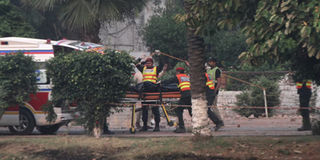India strikes Pakistan over tourist killings, Pakistan says it will retaliate

Rescuers wheel a body towards an ambulance after it was recovered from a building hit by an Indian strike in Muridke near Lahore, Pakistan, May 7, 2025. PHOTO | REUTERS
What you need to know:
- India said it struck nine "terrorist infrastructure" sites, some of them linked to an attack by Islamist militants that killed 25 Hindu tourists and one local in Indian Kashmir last month.
Muzaffarabad. India hit Pakistan and Pakistani Kashmir with missiles on Wednesday and Pakistan said it had shot down five Indian aircraft and vowed to retaliate, in the worst clash in more than two decades between the nuclear-armed neighbours.
India told more than a dozen foreign envoys in New Delhi that "if Pakistan responds, India will respond", fuelling fears of a larger military conflict in one of the world's most dangerous - and most populated - nuclear flashpoint regions.
The escalation comes at a fragile moment for Pakistan's $350 billion economy, which recently emerged from a crisis with the government trying to shore up finances and make progress on the $7 billion International Monetary Fund loan programme of 2024.
India said it struck nine "terrorist infrastructure" sites, some of them linked to an attack by Islamist militants that killed 25 Hindu tourists and one local in Indian Kashmir last month.
Pakistan said at least 26 of its civilians had been killed and that India "had ignited an inferno in the region".
Islamabad pledged to respond "at a time, place and manner of its choosing to avenge the loss of innocent Pakistani lives and blatant violation of its sovereignty", emphatically rejecting Indian allegations it had terrorist camps on its territory.
The Indian strikes included Punjab, Pakistan's most populous province, for the first time since the last full-scale war between the old enemies more than half a century ago.
"The targets we had set were destroyed with exactness according to a well-planned strategy," India's Defence Minister Rajnath Singh said. "We have shown sensitivity by ensuring that no civilian population was affected in the slightest."
Islamabad said none of the six locations targeted in Pakistan were militant camps. At least 26 civilians were killed and 46 wounded, a Pakistan military spokesperson said.
Indian TV channels showed videos of explosions, fire, large plumes of smoke in the night sky and people fleeing in several places in Pakistan and Pakistani Kashmir. Reuters could not independently verify the footage.
In Muzaffarabad, the capital of Pakistani Kashmir, the Indian strike had badly damaged a mosque-seminary in the heart of the city. Five missiles killed three people in the two storey structure, which also had residential quarters, locals said.
Reuters journalists saw the roof and walls of the concrete building crumbled under the impact of the strikes and household items scattered on the first floor.
Hindu-majority India and Islamic Pakistan have fought two of their three wars since independence in 1947 over Muslim-majority Kashmir, which both sides claim in full and control in part.
'OPERATION SINDOOR'
The Pakistan prime minister's office said five Indian fighter jets and drones had been shot down, although this was not confirmed by India. The Indian embassy in Beijing called reports of fighter jets downed by Pakistan "disinformation".
Local government sources in Indian Kashmir told Reuters three fighter jets had crashed in separate areas of the Himalayan region overnight and their pilots had been hospitalised. Indian defence ministry officials did not respond to Reuters requests for comment.
Images circulating on local media showed a large, damaged cylindrical chunk of silver-coloured metal lying in a field at one of the crash sites. Reuters could not immediately verify the authenticity of the image.
Indian forces attacked facilities linked to Islamist militant groups Jaish-e-Mohammed and Lashkar-e-Taiba, two Indian military spokespeople told a briefing in New Delhi, in what New Delhi called "Operation Sindoor".
Jaish said 10 relatives of its leader Masood Azhar - who was released from an Indian jail in 1999 in exchange for 155 hostages from a hijacked Indian Airlines plane - were killed, with no mention of the fate of Azhar himself.
Sindoor is the Hindi language word for vermilion, a red powder that Hindu women put on the forehead or parting of their hair as a sign of marriage.
India had earlier said two of three suspects in the tourist attack were Pakistani nationals, without detailing any evidence. Pakistan has denied any links to the attack and called for an independent investigation.
Wednesday's strikes used precision weapons to target "terrorist camps" that served as recruitment centres, launchpads and indoctrination centres and housed weapons and training facilities, Indian military spokespeople said.
Indian Foreign Secretary Vikram Misri, the top official in its external affairs ministry, said the strikes were to pre-empt further attacks on India.
Misri briefed 13 foreign envoys in New Delhi on the strikes, an Indian source familiar with the developments said.
"India made it clear that if Pakistan responds, India will respond," the source said.
The neighbours also exchanged intense shelling and heavy gunfire across the "line of control", their de facto border in Kashmir, with 13 civilians killed and 43 wounded on the Indian side and at least six killed on the Pakistani side, officials there said.
RISK OF ESCALATION
The scale of the strikes went far beyond New Delhi's response to previous attacks in Kashmir it has blamed on Pakistan.
"Given the scale of the Indian strike, which was far greater than what we saw in 2019, we can expect a sizable Pakistani response," said Michael Kugelman, a Washington-based South Asia analyst and writer for the Foreign Policy magazine.
U.S. President Donald Trump called the fighting "a shame" and added, "I hope it ends quickly." The State Department said Secretary of State Marco Rubio spoke to the national security advisers of both nations, urging "both to keep lines of communication open and avoid escalation".
There were calls for restraint from U.N. Secretary-General Antonio Guterres, China, which neighbours both India and Pakistan, and Russia as well as Britain, which agreed a free trade deal with India on Tuesday.
Many people in both countries voiced anger and hostility.
"Pakistan has been testing our patience. The good thing is India is taking revenge," said Kumar Ravi Shankar, a Delhi lawyer.
In Pakistan, businessman Umbreen Mahar said: "No one in today's world wants to favour war. But if India continues to slander us and then attack, Pakistan has the right to retaliate and defend its sovereignty."
AIRLINES CANCEL FLIGHTS
Pakistan's international bonds rose, reversing early losses, while the benchmark share index fell 2.2percent, after opening nearly 6 percent lower.
India's stock market benchmarks closed little changed, while the Indian rupee closed nearly 0.5 percent lower at 84.8250 against the U.S. dollar, marking its worst performance since April 9.
Several airlines cancelled flights in areas of India and Pakistan due to closures of airports and airspace. Pakistan later said its airspace was available and safe.





